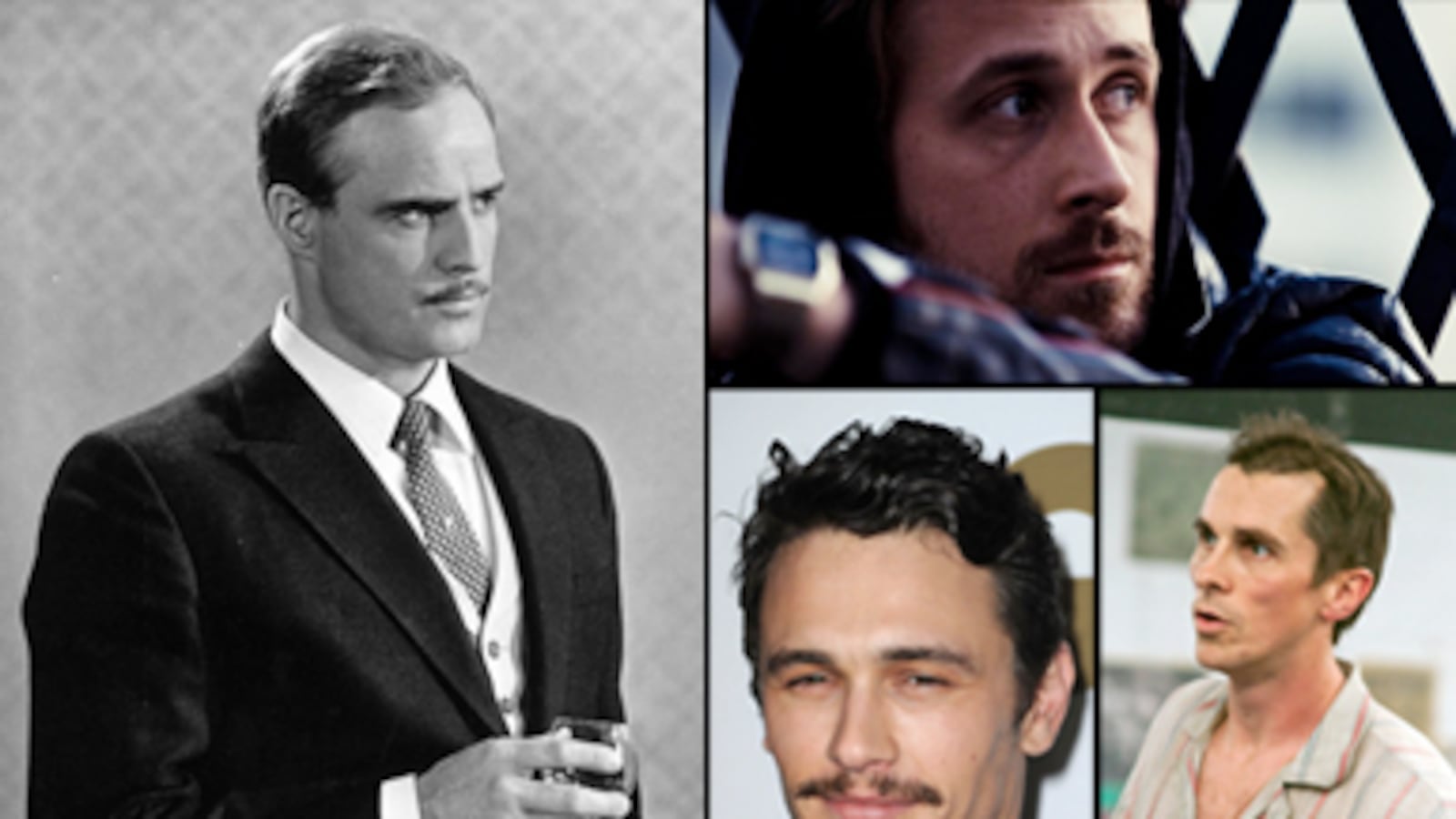It’s there in Ryan Gosling’s affected Brooklyn accent, in Christian Bale’s torturous devotion to character, in James Franco’s manic artist’s life, and even in Inception scene-stealer Tom Hardy’s gay teenage years. Call it the Marlon Brando effect.
Like every serious young male actor since James Dean, these guys are paying homage—sometimes consciously, sometimes not–to the man who originated a certain persona that’s now cliché, that of the sensitive macho, the complicated artist, the press-shy diva with depth. Every recent generation of thespians has had its gang of Brando acolytes. Jack Nicholson, Robert De Niro and Al Pacino were among the first. Sean Penn, Johnny Depp, and Daniel Day Lewis followed them.
Gosling is the most conspicuous of this latest bunch. As a boy, he deliberately disguised his Canadian accent to give it a little Brando bravado. Then there he was last month on the cover of New York magazine wearing a sexy frown, a tight white T-shirt and a toothpick, a la Stanley Kowalksi. In his harrowing relationship drama Blue Valentine, Gosling’s young working class romantic Dean would have fit right in on the docks next to Brando’s Terry Malloy in On the Waterfront.
“You can’t help but be affected by him,” Gosling recently told The Daily Beast. “I think all of us are.”
But the Brando effect is just as evident in the lifestyles these actors cultivate as it is in their work. It is, for instance, de rigeur for them to dedicate themselves body and soul to a role, employing their own version of Brando’s immersive, so-called method acting, and then, in a burst of machismo, dismiss the whole enterprise as frivolous.
Of course, as a young man, Brando took himself and his work very seriously. So much so, that he ultimately revolutionized the art form, influencing the budding greats of his own time from James Dean to Paul Newman. He first studied with acting coach Stella Adler, herself a devotee of Russian theater director and actor Konstantin Stanislavski and his notion of “living truthfully under imaginary circumstances.” Adler famously instructed her students, “Don’t act. Behave.”
For Brando, that meant discarding the formal diction and stiff demeanor that characterized the performances of early matinee idols such as Gary Cooper or Tyrone Power for a more natural style of speech and more realistic body language. It also meant he researched his characters tirelessly to bring the most authenticity to each portrayal, a technique foreign to American actors at the time. Despite his hard work, though, Brando was rarely satisfied with his own performances and quickly became disillusioned with Hollywood.
In 2007, Gosling echoed Brando’s self-deprecating pose. “I don’t really consider this an art,” he told me then. “This is a job.”

He famously walked out of his first screening of his Oscar-winning performance in On The Waterfront because he was so embarrassed. A few years later, the 33-year-old Brando told Truman Capote after a day’s work (which would earn him another Oscar nomination) on his big budget Japanese melodrama Sayonara: “The only reason I’m here is that I don’t yet have the moral courage to turn down the money.”
In 2007, Gosling echoed Brando’s self-deprecating pose, casting off the nights he’d spent living in an unheated garage to live the role of a man who falls in love with a sex doll in Lars and the Real Girl. “I don’t really consider this an art,” he told me then. “This is a job.”
Even Christian Bale, who so immersed himself in The Machinist and The Fighter that he’s virtually unrecognizable in both, feels compelled to diminish the work.
“I have a very sissy job, where I go to work and get my hair done, and people do my makeup, and I go and say lines and people spoil me rotten,” he told Esquire recently. “This is just not something to be quite as proud of as many people would have you believe.”
The Brando effect has its irreverent side too. Brando himself was famous for his sense of humor. Watch how he toys with Dick Cavett in this mid-1970s interview, rendering the veteran talk show host a blushing fan. And listen to Penn detail (with his own Brando-esque restraint) how Brando nicknamed himself “Branflakes” because his own name had been co-opted by his fame.
Franco effectively emulates (with contemporary panache) this aspect of Brando with his self-parodying stint on General Hospital and his short-lived comic web series Acting With James Franco. And he furthers the Brando effect in his rabid pursuit of intellectualism–the novel-writing, the performance art, the gallery openings. (In the early years, Brando was often pecking away at a script or a novel and he liked to surround himself with struggling artists.)
But Gosling, too, has a goofy, arty side. He likes to take ballet lessons, plays in a band called Dead Man’s Bones, occasionally takes shifts at a downtown Los Angeles deli and waits tables at Tagine, a Beverly Hills restaurant he co-owns.
Some of this earnest effort among young actors reflects, as author Leo Braudy pointed out to me, the general “casting around for a new form of masculinity” that’s as prevalent now as it was during the post-war years that Brando rose to fame.
“After World War II there was an addition to the possible images of American masculinity,” says Braudy, author of the 2006 book On the Waterfront, an examination of Elia Kazan’s film. “You get people like Brando and Dean and Montgomery Clift coming in as a more vulnerable masculinity. Even Stanley Kowalski is macho bluster on top of a kind of vulnerability. That’s what has come back now.”
This time around, though, the gay question inevitably surfaces when an actor demonstrates a certain brand of sensitivity coupled with mustachioed manliness.
Brando, who once played a gay soldier, was ahead of his time in confronting the question head-on. In a 1986 biography The Only Contender, he acknowledged that “like a large number of men, I, too, have had homosexual experiences and I am not ashamed.” Like him, Inception star Hardy, a beefcake Brit with a Brando-style pout, owned up last summer to the gay affairs he had as a teenager.
Franco, on the other hand, employs a Brando-style insouciance where the media’s interest in his gender preference is concerned.
“There are lots of other reasons to be interested in gay characters than wanting myself to go out and have sex with guys,” he told Entertainment Weekly earlier this month. Namely, he said, more challenging roles. But Franco couldn’t resist embellishing that with a question: “Or, you know what? Maybe I’m just gay.”
View Our Complete Awards Coverage >>
Daily Beast staffer Nicole LaPorte contributed to this report.
Gina Piccalo is a senior writer at The Daily Beast. She spent a decade at the Los Angeles Times covering Hollywood and is also a former contributing writer for Los Angeles Magazine. Her work has appeared in Elle, More and Emmy. She can be found at ginapiccalo.com.





